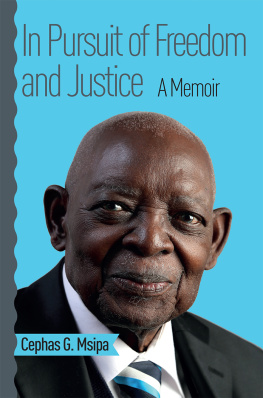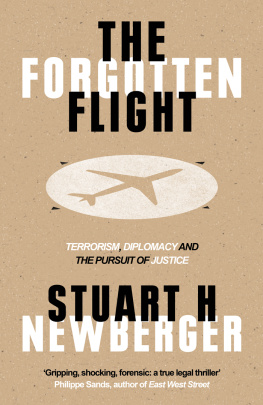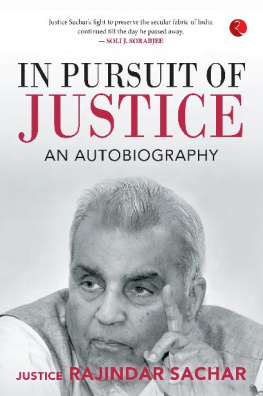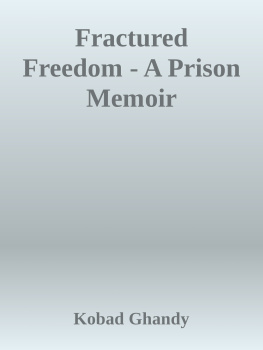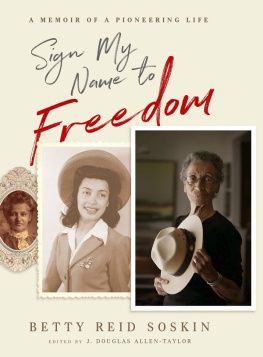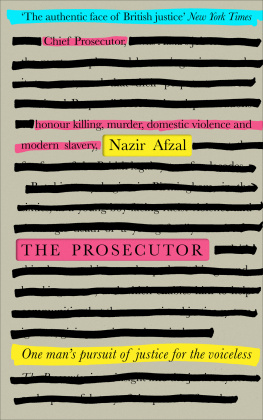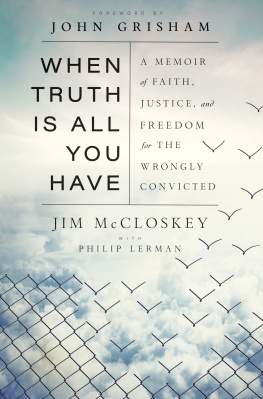Published by
Weaver Press, Box A1922, Avondale, Harare. 2015
Cephas George Msipa
Typeset by Weaver Press
Cover photograph: Wide Angle
Cover Design: Danes Design, Harare
Map: Street Savvy
Printed by: Directory Publishers, Bulawayo
Photograph on pp. 28, 67, 96 courtesy of the National Archives and the Ministry of Information in Zimbabwe.
All other photographs from the authors private collection.
All rights reserved. No part of the publication may be reproduced, stored in a retrieval system or transmitted in any form by any means electronic, mechanical, photocopying, recording, or otherwise without the express written permission of the publisher.
ISBN: 978-1-77922-282-4
Acknowledgements
I am deeply appreciative of my family and friends for their help, time, advice, support and encouragement as I worked on this memoir. My sons worked long and arduously on my story to ensure that the details were as correct as we could make them and that the text had a sequential flow.
My heartfelt gratitude to Primrose Faku and Tsitsi Muchohonyi my administrative assistants, who worked for many hours to research some of the material and to do the original typing of the manuscript from my dictation.
My good friends Professor Ngwabi Bhebhe, Professor Rungano Jonas Zvobgo and Dr Hazel Ngoshi have been very generous with their time in reading and commenting on earlier drafts of the book.
Many other people have rendered invaluable assistance to me in compiling these reminiscences and reflections. To them all I express my sincere appreciation.
I dedicate this book to my parents, Elijah and Anne Msipa, for nurturing and believing in me and for their support, guidance and love for me and for my brothers and sisters.
I can never repay the debt of gratitude I owe to my wife, Charlotte Sithabile Msipa, who stood by me through thick and thin and with whom I shared my life and adventures for over 55 years until her death in April 2013.
F OREWORD
I t was in Gweru, in mid-2008, that I first had a personal encounter with Cephas Msipa. Prior to that, he had been a political figure I saw on television, read about in the newspapers or met in banking halls where he would humbly join the queues like everybody else. I had always admired the gentility and sobriety of character. The circumstances of my meeting him were purely academic. I was young and my academic career was in its infancy. When a faculty meeting at the local university proposed that we confer an honorary doctorate on a distinguished individual, Cephas Msipas name was the first one suggested. In my youthful excitement, I volunteered to write the proposal for the citation since I had access to some historical material a colleague was working on. Through one of his aides, Msipa came to know about me and we were introduced to each other. Even though the honorary doctorate was later conferred by the Faculty of Commerce, my contact with him had been established. He struck me as a fatherly figure. I did not attend the graduation ceremony where the doctorate was conferred, but a colleague told me of how he had looked for me everywhere to be with him and President Mugabe for a photo session.
This relationship and the fact that I had told Dr Msipa of my intention to undertake doctoral studies with a focus on autobiography partly provided the impetus for this his autobiography. I say partly because he has always been clear about his motivations for writing a memoir:
I want to leave a record hoping those coming after me may benefit from my experiences in detention, the liberation struggle and what we went through, lest people may forget. I want to continue to talk to people even after I am dead. I am putting myself on the line to say here: I am, this is what I have said and hear what people will say.
He has often added, I know Robert more intimately than most people do. Those who respect his political culture have also been nagging him for his story:
What motivated me most was that people I spoke to, both black and white, urged me to write about my long journey from Rhodesia to Zimbabwe. The period between 1957 and 1980 was of great political significance as it brought an end to colonialism.
The result is a story of personal contribution to the liberation of Zimbabwe, and the public and private sectors of this country. It is a story about his family and childhood, which shaped his dreams, and the colonial experiences including detention that sharpened those dreams and the struggle to fulfil them. It is the story of an honest man.
Cephas Msipas character is unassuming, but his life has been extraordinary in many regards, mainly because of a professional and political career that spans close to six decades. He belongs to the generation of illustrious Zimbabweans who fought for our independence and went on to contribute to the nation-building process. What separates him from his peers is the level-headedness and sincerity of his political praxis. As a politician, he has always acted above the fray and his contributions have always been carefully considered. If there is ethics in politics, he is best qualified to personify ethical politics.
This book is the story of multi-layered narratives of life lived as a young man struggling to earn an education; it recounts the growth in political consciousness of a young and dedicated educationist who becomes increasingly politically aware due to the ways in which the Rhodesian state oppressed black people. He claims in the narrative that he was a teacher by profession and politician by circumstance. The book also contains an alternative narrative of post-independent Zimbabwe in which he articulates a version of political developments in the early days of our nation initially from a ZAPU perspective and later from a ZANU-PF insiders perspective. Msipa articulates the intrigues of the early days of Zimbabwe the conflicting agendas for the new nation, the dark episode of Gukurahundi and the ensuing political compromises that had to be made with a candour that belies his diplomatic personality. Perhaps, again, Msipa is one politician to talk about Zimbabwean politics and he does so without rancour. Written in simple, accessible language, the narrative addresses in some detail, the most important milestones in the political history of this country.
Msipa also takes us through the rich tapestry of his personal life as it interweaves with the nations history. There is no artificiality or affectation as he chronicles his political culture and his idea of service within both the public and private sectors of Zimbabwe. His political culture is distinct from that of some of his colleagues. He writes that he vowed never to use violence as a political tool after observing the culture of fear among our people. The narrative is equally introspective as he revisits his role in nation-building. The question that haunted him while in the public sector, and still does, is, Why are we so poor? This is in view of the fact that Zimbabwe remains poor despite being richly endowed with abundant resources that could benefit its people.
To put it mildly, the general feeling today is that we are fast approaching the end of an era (the era of old nationalist politicians). Msipa has repeatedly told me: You see, I am old now, my days are numbered, I need to finish this book. If I die now, some things will be left untold. If this is true, then there is urgent need, today, for documenting Zimbabwes past in autobiography. There is therefore real virtue in Msipas book, especially for historians and theorists of autobiography.


